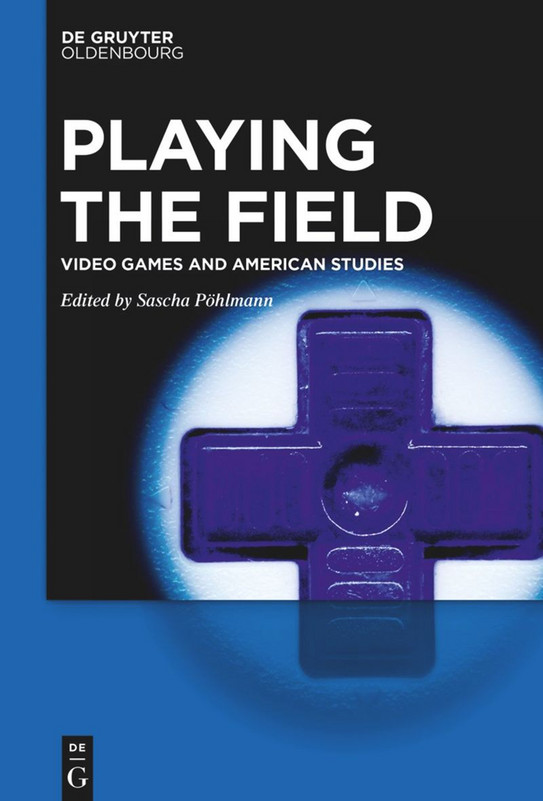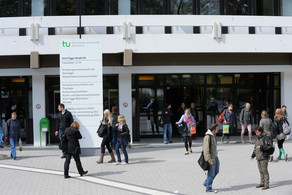
“Playing the Field” is a collaborative interdisciplinary research initiative started by German American Studies scholars in 2018. Its objective is to create a welcoming and informal environment that fosters academic conversations about video games in our field and beyond. Broadly speaking, we are interested in how the theories and methods of American Studies may be fruitfully brought to bear on video games as objects of research, and how in turn video games change these theories and methods. We pursue these questions together with other international scholars, scientists, and artists from various disciplines.
To create a forum for these conversations, “Playing the Field” began its life in 2018 as an international conference, and it has now grown into a series of conferences and workshops that regularly brings together researchers from around the globe.
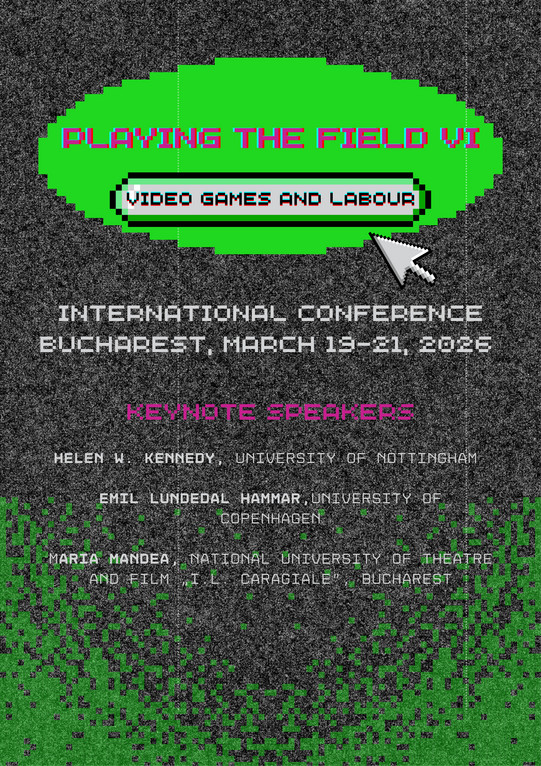
Playing the Field VI: Video Games and Labour
University of Bucharest, Romania
19-21 March 2026
(in-person)
Keynote speakers:
Helen W. Kennedy (Nottingham)
Emil Lunedar Hammar (Copenhagen)
Maria Mandea (Bukarest)
The proposed sixth instalment of the international Playing the Field conference series focuses on the multifaceted relationship between video games and labour. Such a topic is particularly relevant today given the aggravating contradictions inherent to neoliberal capitalism on a global scale, as well as a tendency in video game cultural studies towards relegating the economic dimension of video games to discussions of class identity representations. To counterbalance the hyperfocus on representation in game studies (which has indeed yielded valuable insights into the political dimension of games and gaming), we encourage a dialectic materialist approach to games that transcends cultural identity and adequately considers the economic material conditions of game rhetoric, reception and production.
Being an outgrowth of Cold War technoculture, video games stand out as a commodity that reflects, reinforces, but can also criticise the postfordist material conditions of labour that blur the distinction between production and consumption. While gameplay is conventionally seen as an empowerment of the consumer, it is worth asking if there is a trade-off for the ergodic digital agency that players enjoy. And if this is indeed the case, what is the economic nature of this trade-off? To provide insight into the complex nexus of gameplay, labour, and the economy, we encourage a broad perspective that looks into the economic dimension of video games from multiple angles and focuses on a variety of topics. These topics include among others:
- Gameplay as immaterial labour
- The political economy of in-game systems
- Representations of historical periods in the evolution of capitalism
- Class-based identities
- Labour and intersectionality (race and ethnicity, gender, disability, madness, sexuality, etc.)
- Coloniality of labour in video games
- Economic counterplay
- Digital divisions of labour
- Practices of avatar customisation
- Environmental/Ecocritical considerations of labour
- Economic discourses in indie and experimental games
- Affect and labour
- Monetisation in gaming
- Video games and AI
- Biopolitics and labour
- Video games and social media
- Gameplay in the (semi-)peripheries of the modern world-system
- Video games in the global digital media ecology
We invite scholars to contribute 20-minute presentations. Abstracts of 300-400 words (bibliography excluded), 5 keywords, and a short bio (100 words) should be submitted to playingthefieldvi@gmail.com no later than 10 September 2025. Committee decisions will be sent out by 15 November 2025.
There will be no participation fee.
A selection of papers will be published in a collective volume to be submitted for publication at Routledge.
Organising committee:
Andrei Nae, University of Bucharest (head of the organising committee)
Alessandra Ciufu, University of Bucharest
Andreea Moise, University of Bucharest
Daria Nedelea, University of Bucharest
Past events
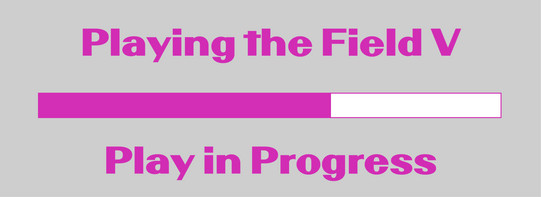
Playing the Field V: Play in Progress (10-11 April, 2025)
Organized by Nicole Mellin and Burak Sezer.
The fifth installment of the Playing the Field conference series invited scholars of (video) game studies to a communal workshop at TU Dortmund. In the course of a continuously growing academic interest in games as both art form and cultural practice, Playing the Field has profited from contributions from many different disciplines, including American Studies, environmental humanities, and political science. This time, we wanted to both take stock of ongoing research as well as provide room for ludic experimentation, creating a welcoming space for people to present their work-in-progress and engage in open discussion.
As this was explicitly designed to be a workshop and not a conference, every participant was invited to present their current research projects and circulate brief excerpts of their own writing or essays that others are expected to read in advance. They were also invited to bring questions, ask the group to play or try out the game as preparation, and explore theoretical and practical directions together. Our Game Lab offered the opportunity to incorporate live gaming and streaming sessions, stressing openness, interactivity, and collaborative work and discussions.
We expressly invited contributions from researchers and scholars who are just starting out in the field, but everyone was welcome to contribute.
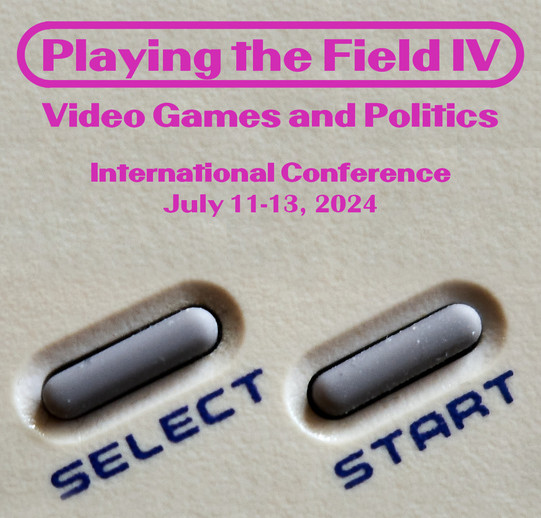
Playing the Field IV: Video Games and Politics
The fourth installment of the Playing the Field conference series in American Studies (organizer: Sascha Pöhlmann) took place at TU Dortmund in 2024. Based on the assumption that while there can be no doubt that video games are political, it is absolutely necessary to talk about how they are political, the conference focused on many different aspects of video game politics: the representation of concrete or abstract political concerns or processes in games; politics as gameplay or an aspect of interactivity; the politics and economics of game production and consumption in global capitalism; games as political tools or media of ideology; the politics of video game historiography; the imagination of identity in games in terms of nationality, gender, ethnicity, etc.; the discursive politicization of games or their construction as non-political spaces; the political aspects of gamer culture and technology; the environmental impact of gaming; politics in game design and game didactics; the relation of video games to popular culture and its politics; the politics of video game journalism; and many more.
Download the program here.

Playing the Field III: Video Game Ecologies and American Studies
(organizer: Nathalie Aghoro)
This conference, which took place at Amerikahaus Munich in 2022, examined the environments that video games affect and are impacted by. It engaged with the notion of ecology as a critical concept that not only allows to study the intermedial, social, and cultural relations that constitute video games and gaming culture. The term also suggests reflections on the impact of gaming and virtual worlds in mainstream media ecologies as well as video game conceptions of human, posthuman, and natural environments.
The theme of video game ecologies sought to facilitate interdisciplinary conversations on the cultural, literary, political, social, and ecological discourses pertaining to the medium. As Megan Condis writes: “Each game utilizes different mechanics to describe and model the relationship between the playercharacter and his or her environment, resulting in a different argument about the type of world we inhabit—or the one we might inhabit in the future” (“Live in Your World, Play in Ours” 90). The conference served as a platform to reflect on the structures, relations, and imaginations involved in these world building practices and the environments they participate in and create.
Immersion and Video Games: A Speaker Series
(organized by Damien Schlarb)
Digital Speaker Series at the Obama Institute for Transnational American Studies, Johannes Gutenberg-University Mainz, Germany
Immersion is a signature characteristic of video games. Even casual observers may appreciate the ability of games to provide compelling experiences that draw in both players and bystanders. Consider passengers on a train who play on their phones during their morning commute; college students holding Mario Kart tournaments in their dorm rooms; professionals unwinding after-hours in front of their laptop, TV, or gaming PC; or children playing learning games on their parents’ tablet computers. To be immersed means inhabiting fully a space where the rules of behavior and modes of being are completely apparent and where actions become immediately meaningful. Compared to navigating the social world, being immersed in mediated environments—digital or otherwise—affords an intensified, optimal experience. Yet immersion also constitutes an ambivalent state of being, simultaneously connoting the intensification and narrowing of cognitive abilities. Immersive experiences promise authenticity but may also cause addiction.
People in information economies seek out overtly designed spaces like video games, theme parks, malls, and cruise ships but also supposedly natural, recreational (yet still framed and mediated) environs like national parks and metropolitan green belts. Workers in postindustrial societies float daily through several interlinked mediated spaces, while the ideologies transported by such seamless states of being can have outsized consequences for those who reside in economically developing areas of the world. In this sense, immersion also connotes questions of liberation and justice. At the same time, immersion implies an awareness of mediation, a notion of the difference between reality and dreamworld, and an inkling of the constant crisscrossing of the various thresholds between the two. The concept of immersion in the context of video games points to larger questions underpinning contemporary discussions about social cohesion, community, work, and education. There are the well-known mores about the detrimental effects games may have on developing psychologies of children and adolescence. But we also see utopian visions of games as panacea to societal problems. Can new thinking be inspired by compelling, immersive games? Can the experience of one’s own agency in games be meaningful beyond the game, perhaps even psychologically reparative? Can immersive gaming help us achieve optimal (job) performance? And if so, does such self-optimizing, utilitarian thinking lead to desirable outcomes?
This speaker series explores these dynamics by bringing together an array of exciting scholars and thinkers who develop fresh approaches to immersion and video games from various disciplinary angles.
For additional information, please see the schedule and visit https://playing.uni-mainz.de

Playing the Field II: Video Games, American Studies, Space
The conversation continued in 2019 at the University of Essen-Duisburg (Essen, Germany) which hosted “Playing the Field II: Video Games, American Studies, Space” (organizer: Dietmar Meinel). This time, presenters considered how games constitute, create, and are enmeshed in digital virtual and non-virtual spaces, inside and outside of their game worlds. In its critical engagement with video games, the conference hopes to contribute to and expand current debates with a thematic focus on a topic central to American Studies: spatiality. Contributions to the conference will bring the rich theoretical repertoire of the study of space in American Studies into conversation with questions about the production, representation, and experience of space in video games.
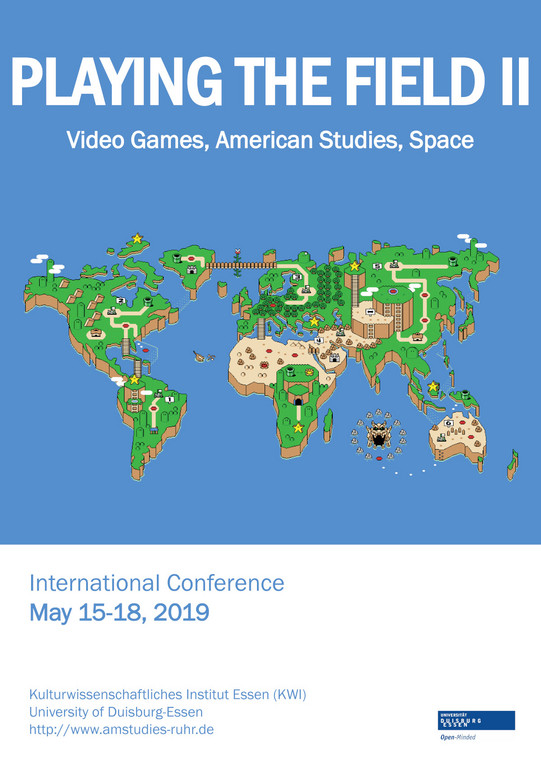
Playing the Field: Video Games and American Studies
The inaugural event, “Playing the Field” (organizer: Sascha Pöhlmann, then LMU Munich), took place in 2018 as a conference at Amerikahaus Munich, Germany. The conference assembled for the first time an international group of Americanists from various European countries and the United States to discuss what their field may contribute to the study of video games, and how the games may change the field itself.
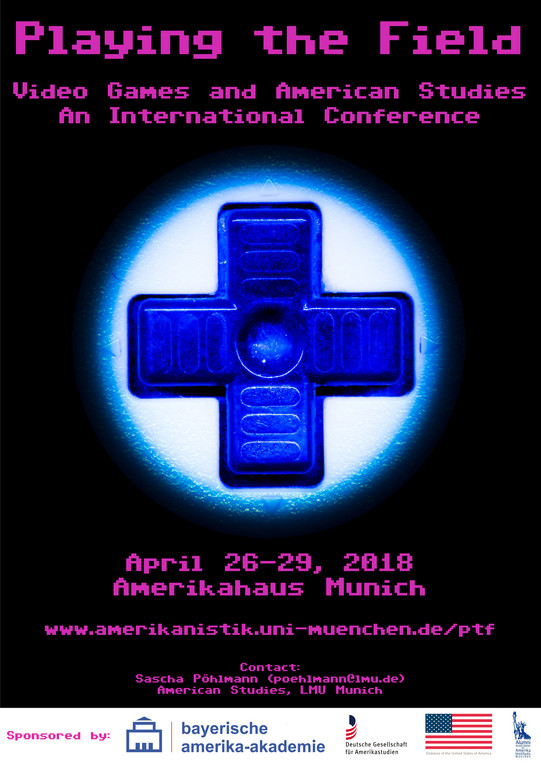
Publications
Video Game Ecologies and Culture, edited by Nathalie Aghoro, de Gruyter, 2025
Video Game Ecologies and Culture examines the environments that video games affect and are impacted by. The edited collection engages with the notion of ecology as a critical concept that allows to study video game conceptions of human, posthuman, and natural environments and explore the entangled eco-cultural formations in video games and gaming. The contributions discuss the theme of video game ecologies with an interdisciplinary emphasis on the cultural, political, social, and ecological discourses pertaining to the medium and reflect on the relations and imaginaries developed through eco/critical video game practices. These interrelations are carved out in essays on relationality, kinship, and capitalist ruins, immersion in virtual marine ecosystems, video games and the commodification of ecocriticism, eco-colonial power formations, playing and recording nature, gender and post-anthropocentric game worlds, time-loop chronotopes, and ludoaffective dissonance and survival in video games.
https://www.degruyterbrill.com/document/doi/10.1515/9783111379715/html

Video Games and Spatiality in American Studies, edited by Dietmar Meinel, de Gruyter, 2022
While video games have blossomed into the foremost expression of contemporary popular culture over the past decades, their critical study occupies a fringe position in American Studies. In its engagement with video games, this book contributes to their study but with a thematic focus on a particularly important subject matter in American Studies: spatiality. The volume explores the production, representation, and experience of places in video games from the perspective of American Studies. Contributions critically interrogate the use of spatial myths (“wilderness,” “frontier,” or “city upon a hill”), explore games as digital borderlands and contact zones, and offer novel approaches to geographical literacy. Eventually, Playing the Field II brings the rich theoretical repertoire of the study of space in American Studies into conversation with questions about the production, representation, and experience of space in video games.
https://www.degruyterbrill.com/document/doi/10.1515/9783110675184/html
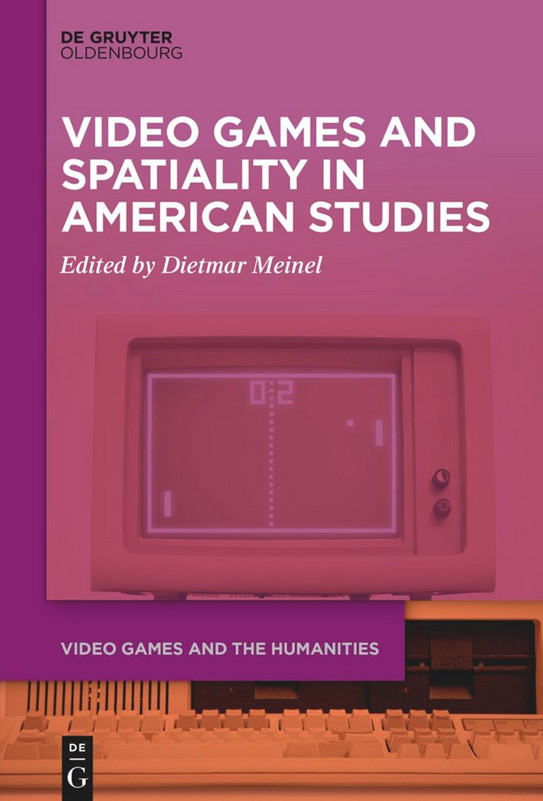
Playing the Field: Video Games and American Studies, edited by Sascha Pöhlmann, de Gruyter, 2019
American Studies has only gradually turned its attention to video games in the twenty-first century, even though the medium has grown into a cultural industry that is arguably the most important force in American and global popular culture today. There is an urgent need for a substantial theoretical reflection on how the field and its object of study relate to each other. This anthology, the first of its kind, seeks to address this need by asking a dialectic question: first, how may American Studies apply its highly diverse theoretical and methodological tools to the analysis of video games, and second, how are these theories and methods in turn affected by the games? The eighteen essays offer exemplary approaches to video games from the perspective of American cultural and historical studies as they consider a broad variety of topics: the US-American games industry, Puritan rhetoric, cultural geography, mobility and race, urbanity and space, digital sports, ludic textuality, survival horror and the eighteenth-century novel, gamer culture and neoliberalism, terrorism and agency, algorithm culture, glitches, theme parks, historical guilt, visual art, sonic meaning-making, and nonverbal gameplay.
Contributions by Jon Adams, Nathalie Aghoro, Alexandra Ileana Bacalu, Jacqueline Blank, David Callahan, Sebastian Domsch, Manuel Franz, Michael Fuchs, Henning Jansen, Veronika Keller, Martin Lüthe, Patricia Maier, Dietmar Meinel, Sabrina Mittermeier, Andrei Nae, Michael Phillips, Sascha Pöhlmann, Damien B. Schlarb, Stefan Schubert, Doug Stark, Stefan Rabitsch, and Mark J. P. Wolf.
https://www.degruyterbrill.com/document/doi/10.1515/9783110675184/html
